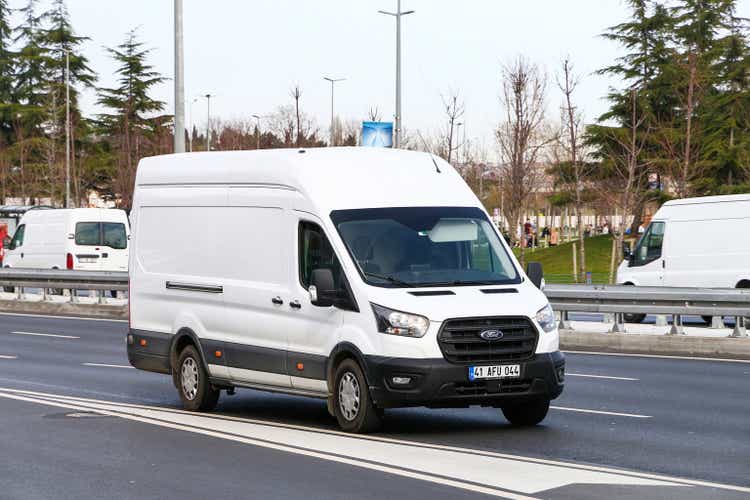DarthArt/iStock Editorial via Getty Images
All sorts of things in our world aren’t what they used to be only a few decades ago. Donald Trump isn’t just a real estate developer. Volvo isn’t Swedish anymore (it’s Chinese). And Ford (NYSE:F) has a crucial operation in Turkey.
Turkey? What’s that?
OK, most of you know Turkey is a country… somewhere. But why is Turkey more significant now all of a sudden than it has been in more than a century?
We’re living in a world of increasing geopolitical risk, including new strains on just-in-time (JIT) inventory management and supply chain disruptions of all kinds. Over the last half-century, and the last 30 years in particular, the supply chains have stretched globally to take advantage of ever-increasing efficiencies, which meant locating them far away where they’re subject to higher transportation costs and risks if there’s a disruption anywhere along the way.
Ford forms a partnership in Turkey
In this context, Ford’s strategy for an R&D and manufacturing location outside of China – but still not in North America or in Europe – has taken on a new level of importance. Ford has a 41% stake in Ford Otosan (FROTO), which is a Turkish entity. It has around 15,000 employees, 10% of whom are engineers.
Focus on vans and trucks
Ford Otosan has primary R&D responsibility inside Ford for the delivery van (“panel van”) product lines. There are three basic sizes/platforms of those vans, only two of whom are sold inside the U.S. All three sizes are sold in Europe.
These delivery vans took on an increasing societal and economic importance in 2020 with the boom in home deliveries. Not only Amazon (AMZN), but also an increasing share of traditional retailers, saw increases in their new or existing home delivery businesses.
Manufacturing capacity doubling from 450,000 to 900,000
Until early 2022, Ford Otosan in Turkey had the capacity to manufacture 330,000 Transit and Custom vans, plus 110,000 Courier vans – per year. In addition, 15,000 large commercial trucks.
In reality, these Ford Otosan manufacturing plants operated well below capacity in 2021, yielding around 348,000 units. This will change in 2022 and beyond, not just because of higher capacity utilization inside Turkey. Ford Otosan is acquiring Ford Europe’s plant capacity located in Romania. This will mean that the overall Ford Otosan annual manufacturing capacity will be approximately 900,000 units in a matter of months from now.
If you apply Ford’s 41% interest in Ford Otosan to the soon-to-be overall 900,000 unit per year production capacity, that implies 369,000 unit-equivalent allocated to Ford’s ownership stake. These commercial vehicles, ranging from small delivery vans to large trucks, are considered some of the most profitable vehicles in the industry. That’s also a reason why they’re given priority in terms of allocation for semiconductors and other components.
Proportionality inside Ford
If you count 348,000 vehicles actually sold in 2021 inside Ford’s overall global 3.9 million number, it’s around 9%. For the overall 2021 capacity of 455,000, it would be almost 12%. Then, looking into late 2022 or 2023, it would potentially be a 900,000 capacity divided by 3.9 million (assuming Ford overall stood still, a dubious assumption). At that point, we would be taking about a 23% share of importance inside Ford.
Then again, Ford’s 21% stake – which implies 369,000 units of capacity post-Romania acquisition – would imply “only” a 9% degree of importance to Ford overall.
That 9% would be higher than Ford Otosan’s overall revenue as a percentage of Ford overall – $7 billion last year compared with $136 billion for Ford overall. Of course, that revenue contribution will be a lot higher next year after the Ford Otosan’s Romania integration.
Ford Otosan has a market cap of approximately $7.3 billion. Ford’s 41% stake in Ford Otosan would therefore be worth approximately $3 billion. That’s just under 5% of Ford’s overall market cap, reflecting that Ford Otosan may be undervalued (7% of revenue, but 5% of market cap) inside Ford’s portfolio, especially if one makes the argument that the Ford Otosan product mix (trucks and vans) really ought to be valued higher than the average Ford vehicle, globally.
Otosan reduces and diversifies geopolitical risk for Ford
Even though Ford makes the Transit van both in Kansas and in Turkey, Ford Otosan is not really “competing” with Ford’s North American operations. Instead, Ford Otosan is serving as a counterbalance against Ford’s development, manufacturing and component supply chain ranging mostly from Europe to Asia.
We saw in 2020 how China decided to isolate itself from the rest of the world. It’s extremely difficult even to travel to China. For example, watch how Finnair has had to completely change its business, which until January 2020 was previously predicated upon flying over Russia into a long list of cities in and around China. In 2022, we have seen a second surge of Chinese lockdowns.
By investing in R&D as well as production in Turkey, Ford is therefore spreading the risk away from unpredictable political events in Asia as well as in Europe. Turkey is a somewhat uncorrelated geography, not beholden to any of the major powers or organizations (other than nominally being part of NATO).
Impact to Ford shareholders
Ford’s structure of increasing exposure to Turkey, with a local Turkish partner, helps de-risk Ford’s overall global supply chain and ability to serve customers in most geographic areas. The least impact may be for the U.S. market, which also is why U.S. shareholders have the hardest time to see the benefits of this de-risking.
When combined with the math outlined above – that suggests Ford Otosan is undervalued inside the overall Ford shareholder umbrella – this additional benefit of Ford facing a new and more uncertain world with lower geopolitical risk vis-a-vis the EU and a China-centric Asia makes for an improved case for Ford stock.


Be the first to comment